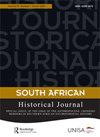Ohm Krüger: Context, Appropriation and Irony
IF 1
3区 历史学
Q1 HISTORY
引用次数: 0
Abstract
ABSTRACT Ohm Krüger premièred in Berlin in 1941 and was widely praised by audiences, critics and the Nazi high command. Joseph Goebbels, the Reich’s Minister of Propaganda, instituted a special award to honour the film, Film der Nation (Film of the Nation), and it was pronounced reichswichtig (important to the state). Ohm Krüger places in parallel the Boer War (1899–1902) 1 1 I have elected to use ‘Boer War’ instead of the more current and correct ‘South African War’ because the former accords more usefully with the language of comment and critique from 1900 to 1941. and the rise of German National Socialism. Presenting these histories as contiguous generates a series of ironies that undermine the film’s propagandist intentions. This is most striking in the concentration camp sequences at its climax. In order to consider the ways in which these scenes are at cross purposes with the ideological logic of the film, this article contextualises Ohm Krüger’s production, reviews the dynamics of its appropriation of the Boer cause, and dwells on its self-subversion. The argument concludes that totalitarianism is based, in part, on inculcating a mindset in its subjects consisting of their capacity to overlook contradictions between hegemony and reality.欧姆·克拉格尔:语境、挪用与反讽
《欧姆·克格尔》于1941年在柏林首演,受到观众、评论家和纳粹最高指挥部的广泛赞誉。德国宣传部长约瑟夫·戈培尔(Joseph Goebbels)设立了一个特别奖来表彰这部电影,即“国家电影”(film der Nation),并将其命名为“对国家重要”(reichswichtig)。我选择使用“布尔战争”而不是更现代、更正确的“南非战争”,因为前者更符合1900年至1941年的评论和批评语言。以及德国国家社会主义的兴起。将这些历史连续呈现,产生了一系列的讽刺,破坏了影片的宣传意图。这在集中营情节的高潮部分最为引人注目。为了考虑这些场景是如何与电影的意识形态逻辑相冲突的,本文将欧姆·克拉格尔的作品置于语境中,回顾其对布尔事业的挪用,并探讨其自我颠覆。该论点的结论是,极权主义的部分基础是在其臣民中灌输一种心态,这种心态包括他们忽视霸权与现实之间矛盾的能力。
本文章由计算机程序翻译,如有差异,请以英文原文为准。
求助全文
约1分钟内获得全文
求助全文
来源期刊

South African Historical Journal
Multiple-
CiteScore
0.70
自引率
0.00%
发文量
37
期刊介绍:
Over the past 40 years, the South African Historical Journal has become renowned and internationally regarded as a premier history journal published in South Africa, promoting significant historical scholarship on the country as well as the southern African region. The journal, which is linked to the Southern African Historical Society, has provided a high-quality medium for original thinking about South African history and has thus shaped - and continues to contribute towards defining - the historiography of the region.
 求助内容:
求助内容: 应助结果提醒方式:
应助结果提醒方式:


